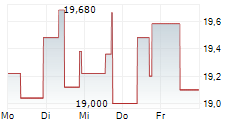Medicover is proud to announce additional results from the ongoing DART clinical study from Oslo University Hospital. The study utilises Medicover Genetics' hybrid capture-based, tumour-agnostic MRD assay. The additional results are based on an expanded population within the DART study and further strengthen the value of Medicover Genetics' ctDNA-based minimal residual disease (MRD) assay as a predictor of disease progression in patients with unresectable stage III non-small cell lung cancer (NSCLC).
The results were presented through a poster presentation on 18 October 2025, at the European Society for Medical Oncology (ESMO) Congress in Berlin, where the study was recognised with one of the congress' Best Poster awards.
The additional results represent another key milestone towards the clinical validation of Medicover Genetics' MRD assay and commercialisation.
"Developing our liquid biopsy portfolio is a key pillar of our genetics strategy, with clinical validation being an important part. We are therefore pleased to have received further clinical evidence for our MRD assay through the additional results. We look forward to additional data from the full patient cohort next year, and commercialisation of our MRD assay in the second half of 2026. This represents our first MRD assay in a series of programs across multiple therapeutic areas and forms part of our longer-term ambition to expand our offering beyond lung cancer," says Staffan Ternström, COO, Diagnostics Services, Medicover.
The mature data include 640 plasma samples from 84 patients. The study demonstrates that detectable circulating tumour DNA (ctDNA) during and after consolidative durvalumab following chemoradiotherapy (CRT) is strongly associated with inferior progression-free survival (PFS) and can predict disease progression months before radiological evidence. Data from the full 86-patient cohort will follow during the first half of 2026.
Detection of ctDNA at six months after the initiation of durvalumab treatment was associated with inferior PFS (HR=2.45; 95% CI: 1.18-5.11; p=0.017). Likewise, detection of ctDNA three months after the end of durvalumab treatment was also associated with inferior PFS (HR=5.37; 95% CI: 1.93-14.93; p=0.001). Importantly, ctDNA detection preceded imaging-based progression by a median of 7.4 months, demonstrating its potential as an early indicator of disease progression.
The DART study (NCT04392505 / EudraCT 2019-002537-11) is a multicentre, prospective phase II trial including 86 patients with unresectable stage III NSCLC across several European centres. The study utilises Medicover Genetics' hybrid capture-based, tumour-agnostic MRD assay, designed to detect and monitor minimal residual disease.
For more information about the DART study and Oslo University Hospital, please refer to the press release announced by Medicover on 2 June 2025 here.
The abstract of the study, published on 13 October 2025, can be found here.
For further information, please contact:
Hanna Bjellquist, Head of Investor Relations
+46 703 033 272
hanna.bjellquist@medicover.com
Medicover is a leading international healthcare and diagnostic services company and was founded in 1995. Medicover operates a large number of ambulatory clinics, hospitals, specialty-care facilities, laboratories and blood-drawing points, and the largest markets are Poland, Germany, Romania and India. In 2024, Medicover had revenue of EUR 2,092 million and more than 47,000 employees. For more information, go to www.medicover.com



